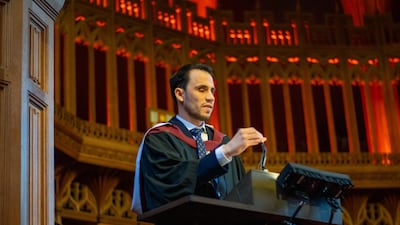A Syrian footballer who lost his eyesight in 2014 as he fled conscription to Bashar Al Assad's forces has graduated in the UK after refusing “to fall into darkness”.
During his graduation, Maher Fattouh, 32, delivered a moving speech to University of Bristol students, telling them how he had been determined to live his life to the full despite his tragedy – and he wants to give others hope.
At the age of 21, Mr Fattouh was blinded by an explosion as he crossed the border into Lebanon. Red Cross doctors confirmed that he would never see again.
Mr Fattouh, from Damascus, had been a full-time footballer when he was injured and had no qualifications. But despite these challenges, he created a new life for himself. He worked hard to find learning materials and would pay a friend to read books to him.
Soon, he was teaching other visually impaired people, and in 2018 he received his high school diploma. Later that year he earned a scholarship to one of Lebanon’s leading universities and in 2022 he received an English teaching qualification from the University of Cambridge.
Then, in 2023, he received another scholarship, this time to study for a psychology of education master’s degree at the University of Bristol. Despite not being able to see, he travelled to the UK on his own.
“For most people, putting on clothes and going to university is easy, but for me it was a project,” Mr Fattouh said. “Even going to the supermarket on the other side of the road was a project. But people are so kind here. If I stopped to wait for a taxi, I’d get many people offering to help me cross the road.
“Bristol really grabbed my attention. The cobbles feel identical with those in old Damascus and both are very ancient, with lots of churches and monuments. I loved the course and I had a lot of extra support from the university and its disability services.”

Mr Fattouh used apps and other technology such as screen readers to help him study and move independently around Bristol. Sometimes he would get lost or slip and hurt himself.
“But I insist on living like everyone else. Even if I fall, nothing will stop me from going out,” he said. “I’d like to show that a person with massive, massive challenges can live safely and independently and achieve academic excellence at a place like the University of Bristol.
“I’m really proud of owning my story. I lived so many dark periods for so long. For a long time one of my dreams was just to open a bank account because I couldn’t as a Syrian.”
Mr Fattouh's graduation speech left some students in tears. He said: “In my community the definition of visual impairment is a ‘fall into darkness’. It means a lot of negative things: no more football, no more camping, no more anything you like.

“You won’t be able to manage, you will live dependent on others, you may be excluded, you may lose opportunities and life may be miserable and depressing.
“But I thought, why do I need to accept that definition, or that continuation of my story? Is it true that all the happiness and meaning in the word are limited to the eyesight? I therefore decided to disagree with that definition, and I chose an entirely different scenario.”
Professor Evelyn Welch, who led the ceremony, described Mr Fattouh as a “remarkable man” who has shown amazing fortitude and resilience despite the challenges in his life.
He has not been back to Syria in more than 10 years, but hopes the fall of the Assad regime will allow him to return and visit his family, most of whom still live in Damascus.


